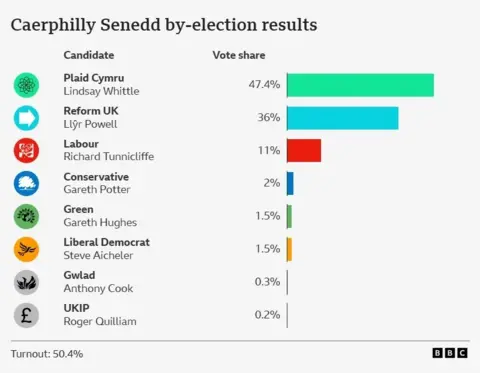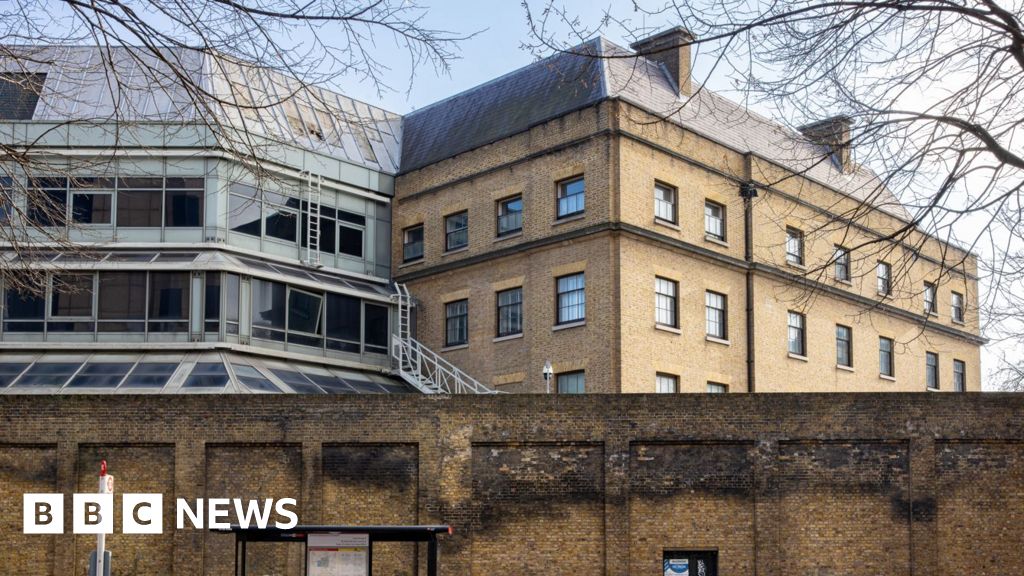David DeansWales political reporter
 Getty Images
Getty ImagesLabour suffered its first parliamentary defeat in Caerphilly for 100 years as Plaid Cymru claimed victory in the Welsh Parliament by-election.
Nigel Farage’s Reform pledged to “throw everything” at the campaign but its candidate, Llŷr Powell, could only finish second to Plaid’s Lindsay Whittle, who took 47% of the vote with a majority of 3,848.
Prime Minister Sir Keir Starmer said he was “deeply disappointed” at the loss, adding: “We clearly need to do much more.”
The result saw a swing of 27% from Labour, which has held the seat in Westminster since the 1920s and in the Senedd since it began at the turn of the century.
Whittle promised to work like “a Trojan for every man, woman and child”.
Celebrating victory outside the town’s castle he said: “I believe the world is watching Wales, an emerging nation starting to control our lives again.”
Plaid leader Rhun ap Iorwerth, who hopes to form the next Welsh government at May’s Senedd election, said the party can “now win in any part of Wales” but was “taking nothing for granted”.
“It is a momentous win, a historic win for Caerphilly, for Plaid Cymru and for the story of Welsh politics,” he added.
Plaid Cymru, which celebrated the 100th anniversary of its founding over the summer, is seen as being on the centre-left of Welsh politics.
Achieving Welsh independence has long been an article of faith for activists.
But ap Iorwerth is downplaying independence for now, promising a plan but not in the first term of any Plaid-led government.
‘Wake up’
Labour First Minister Eluned Morgan told BBC Wales she had spoken to Sir Keir on Friday morning and said he understood he “has a responsibility to help us out in Wales” following the party’s humiliation.
She admitted finishing in third place was a “bad result for Labour” but insisted she would not resign.
The prime minister said the UK and Welsh administrations needed to “reflect and regroup” after Friday’s result.
Asked whether he would resign if he could not turn around Labour’s fortunes by the Senedd elections in May, Sir Keir said: “In relation to the by-election, look, I’m deeply disappointed in the results. I’m not going to suggest otherwise.
“I spoke to the first minister this morning, and clearly we need to reflect and regroup and double down on delivery in Wales, and we clearly need to do much more.”
Former senior Labour cabinet minister and Neath MP Lord Peter Hain said the government needs to “wake up” to the challenges facing the party in the devolved nations.
The former Welsh secretary told the BBC Radio 4’s PM programme there wasn’t “sufficient understanding in No 10 of the depths of the crisis that Labour is in across the whole of the UK.”
He added: “Devolution was about empowering the different parts of the United Kingdom and that also requires the centre to listen.
“I don’t think there’s been enough listening up to this point.”

Whittle, a former Caerphilly council leader and councillor for almost 50 years, previously served in Cardiff Bay between 2011 and 2016 representing the South Wales East region.
He paid an emotional tribute to the late Caerphilly Member of the Senedd (MS) Hefin David, whose death triggered the by-election, saying his “kindness” was the “guiding spirit” of his campaign.
In his overnight victory speech to jubilant supporters, Whittle said: “Listen Westminster, this is Caerphilly and Wales telling you we want a better deal.”
Ap Iorwerth said Caerphilly voters had “chosen hope over division, and progress over the tired status quo, and backed Plaid Cymru’s positive, pro-Wales vision”.
Turnout was just over 50% – higher than 2021’s 44% in Caerphilly – compared to the national average for a Senedd vote which has never been over 50%.
Reform won only 495 votes four years ago but found itself in a battle with Plaid Cymru, coming second with 36% of the vote.
Labour’s Richard Tunnicliffe won just 11% of the vote and came third.
The constituency was visited by a series of senior figures from the party in the last few days, including Farage, who campaigned in Caerphilly on Thursday.
Despite the result Llŷr Powell said he thought Reform would form the next Welsh government.
“We’ve got more people turning out to vote now when they’ve got a party they believe in.”
On Friday, Farage predicted May’s Senedd election would be a “two-horse race between Reform UK and Plaid Cymru”.
“The total collapse of the Labour vote to Plaid was to a party that people know well and to a popular local politician,” he wrote on social media.
 Sam Robinson/BBC
Sam Robinson/BBCLabour had held Caerphilly since the National Assembly, as the Welsh Parliament – or Senedd – was then called, opened in 1999.
The result leaves the party two seats short of a majority, making it harder for it to govern ahead of a crucial vote on its budget in January.
It has already begun talks with opposition leaders in an effort to work out how it can get through its spending plans on the NHS, education and other services.
Morgan congratulated the Plaid Cymru candidate and said the by-election was held “in the toughest of circumstances and in the midst of difficult headwinds nationally”.
She said Labour had heard “the frustration on doorsteps” and insisted the party was “listening, we are learning the lessons and we will be come back stronger”.
Whatever happens next, Caerphilly has written itself into the pages of Welsh political history as 100 years of Labour rule came crashing down.
We are about to find out if this result is an eye-opening anomaly or a genuinely new chapter.
Read more analysis from Wales political editor Gareth Lewis here



